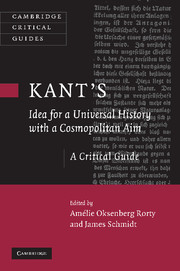Book contents
- Frontmatter
- Contents
- List of contributors
- List of abbreviations
- Introduction: history as philosophy
- Idea for a Universal History with a Cosmopolitan Aim
- 1 Teleology and history in Kant: the critical foundations of Kant's philosophy of history
- 2 The purposive development of human capacities
- 3 Reason as a species characteristic
- 4 Good out of evil: Kant and the idea of unsocial sociability
- 5 Kant's Fourth Proposition: the unsociable sociability of human nature
- 6 The crooked timber of mankind
- 7 A habitat for humanity
- 8 Kant's changing cosmopolitanism
- 9 The hidden plan of nature
- 10 Providence as progress: Kant's variations on a tale of origins
- 11 Norms, facts, and the philosophy of history
- 12 Philosophy helps history
- Bibliography
- Index of names and works
10 - Providence as progress: Kant's variations on a tale of origins
Published online by Cambridge University Press: 28 July 2009
- Frontmatter
- Contents
- List of contributors
- List of abbreviations
- Introduction: history as philosophy
- Idea for a Universal History with a Cosmopolitan Aim
- 1 Teleology and history in Kant: the critical foundations of Kant's philosophy of history
- 2 The purposive development of human capacities
- 3 Reason as a species characteristic
- 4 Good out of evil: Kant and the idea of unsocial sociability
- 5 Kant's Fourth Proposition: the unsociable sociability of human nature
- 6 The crooked timber of mankind
- 7 A habitat for humanity
- 8 Kant's changing cosmopolitanism
- 9 The hidden plan of nature
- 10 Providence as progress: Kant's variations on a tale of origins
- 11 Norms, facts, and the philosophy of history
- 12 Philosophy helps history
- Bibliography
- Index of names and works
Summary
Kant's Idea For a Universal History articulates a vision of a future for the human race centered on the idea of a “cosmopolitan goal” – a world order in which institutions and practices of international justice will achieve, for the relations between nations, something analogous to the relations and restraints which transform a collection of individuals into an ordered state. Kant is here deeply concerned with the idea of progress – with the question whether human life is getting better or worse, and with how his own times should be judged with regard to maturity in reason and morals. But this rich and elegantly constructed essay is also centrally concerned with the idea of Providence, and Kant's ingenious conceptual play with that idea marks a crucial point of transition in its history: its transformation into the secular idea of progress. In this essay I want to focus on the relations between Kant's treatment of Providence, his version of cosmopolitanism, and his ingenious use of a narrative device – a philosophical story of human origins and development.
The conceptual connections between Providence and cosmopolitanism can be difficult to grasp, now that cosmopolitanism has come to mean little more than cultural sophistication, while the idea of Providence is relegated to religious piety. Novel though Kant's version of Providence is, the connections he draws between Providence and cosmopolitanism are not new. Both ideas, and the connections between them, go back to ancient Greek thought.
- Type
- Chapter
- Information
- Kant's Idea for a Universal History with a Cosmopolitan Aim , pp. 200 - 215Publisher: Cambridge University PressPrint publication year: 2009
- 2
- Cited by



